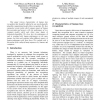94 search results - page 9 / 19 » A Hippocampal Model of Recognition Memory |
ICCSA
2003
Springer
15 years 4 months ago
2003
Springer
A speaker model in speaker recognition system is to be trained from a large data set gathered in multiple sessions. Large data set requires large amount of memory and computation, ...
COLT
1994
Springer
15 years 3 months ago
1994
Springer
We propose and analyze a distribution learning algorithm for variable memory length Markov processes. These processes can be described by a subclass of probabilistic nite automata...
FGR
1998
IEEE
15 years 3 months ago
1998
IEEE
This paper reviews characteristics of human face recognition that should be reflected in any psychologically plausible computational model of face recognition. We then summarise r...
ACL
2001
15 years 19 days ago
2001
Current alternatives for language modeling are statistical techniques based on large amounts of training data, and hand-crafted context-free or finite-state grammars that are diff...
101
click to vote
ICCV
1995
IEEE
15 years 2 months ago
1995
IEEE
A general-purpose object indexingtechnique is described that combines the virtues of principal component analysis with the favorable matching properties of high-dimensional spaces...

